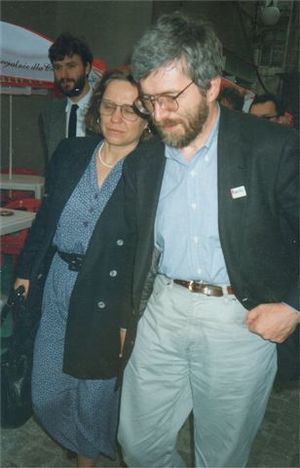Stanisław Barańczak facts for kids
Quick facts for kids
Stanisław Barańczak
|
|
|---|---|

Stanisław Barańczak with his wife Anna in 1995
|
|
| Born | November 13, 1946 Poznań, Poland |
| Died | December 26, 2014 (aged 68) Newtonville, Massachusetts, US |
| Occupation | poet, literary critic, translator |
| Nationality | Polish |
| Alma mater | Adam Mickiewicz University |
| Notable awards | Kościelski Award (1972) PEN Translation Prize (1996) Nike Award (1999) Silesius Poetry Award (2009) Medal for Merit to Culture – Gloria Artis (2014) Grand Cross of the Order of Polonia Restituta (2016) |
| Spouse | Anna Brylka |
| Children | Michael Anna |
| Relatives | Małgorzata Musierowicz (sister) |
Stanisław Barańczak (born November 13, 1946, died December 26, 2014) was a famous Polish poet, critic, and translator. He is especially known for translating plays by William Shakespeare and poems by E. E. Cummings, Emily Dickinson, and others from English into Polish. He also translated Polish poetry into English.
Contents
Early Life and Education
Stanisław Barańczak was born in Poznań, Poland, on November 13, 1946. His parents, Jan and Zofia, were both doctors. He had a sister named Małgorzata Musierowicz, who became a novelist.
Stanisław studied philology at Adam Mickiewicz University in Poznań. This is a field where you study language and literature. He earned both his master's and doctoral degrees there. His special research for his doctorate was about the poetic language of another writer, Miron Białoszewski. In 1968, he married Anna Brylka, and they had two children, Michael and Anna.
A Career in Literature
Stanisław Barańczak began teaching at Adam Mickiewicz University. He started publishing his own poems and critical essays in 1965. From 1967 to 1971, he worked for a magazine in Poznań called Nurt.
Standing Up for Change
After some important political events in Poland in June 1976, Stanisław became a co-founder of the Workers' Defence Committee (KOR). This was a group that worked secretly to help people who were being treated unfairly by the government. He also helped start a secret magazine called Zapis.
In 1981, when Poland declared martial law (a time when the military takes control), he left the country. He moved to the United States and started teaching at Harvard University. He stayed at Harvard for nearly 20 years, until 1999. He left because of health problems related to Parkinson's disease.
Even while in the US, he continued his work. He helped start a literary magazine in Paris called Zeszyty Literackie (which means "Literary Textbooks") in 1983. He also wrote regularly for another magazine, Teksty Drugie. From 1986 to 1990, he was the editor of The Polish Review.
A Master of Words
Barańczak was a leading figure in the Polish "New Wave" movement. This group of poets wanted to use language in new and fresh ways. He is seen as one of the best translators of English poetry into Polish, and Polish poetry into English.
He won the PEN Translation Prize in 1996 with Clare Cavanagh. His book, Surgical Precision (Chirurgiczna precyzja), won the 1999 Nike Award. This is Poland's highest award for literature.
His own poems often explored themes of right and wrong, politics, and literature itself. He was known for his smooth and flexible use of language. His poems showed his strong interest in social issues. He started as a critic who used poetry to comment on language and society. However, his greatest achievements came from his skill with poetic forms, like a master craftsman of words.
How He Translated Poetry
Barańczak came up with an idea called the "semantic dominant" for translating poetry. He believed that every poem has a "key to its content." This is the most important part of the poem, which could be its rhymes, rhythm, sentence structure, or other special style elements. He thought a translator's main job was to find this key feature and make sure it was the most important part of the translated poem too. He wrote about this idea in his essay "Small but Maximalistic Translatological Manifest."
Some of his poems were even turned into songs by the musician Jan Krzysztof Kelus.
Later Years and Death
Stanisław Barańczak passed away at age 68 on December 26, 2014, in Newtonville, Massachusetts. He had been ill for a long time. He was buried at Mount Auburn Cemetery.
 | Leon Lynch |
 | Milton P. Webster |
 | Ferdinand Smith |

